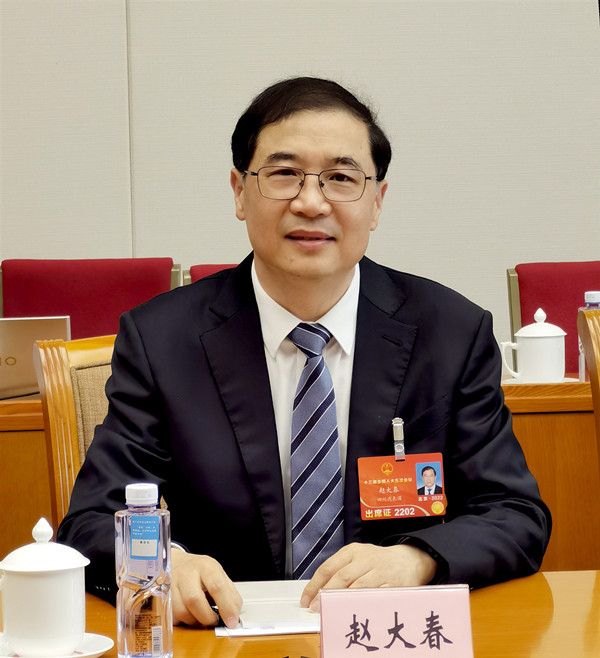China should improve e-government infrastructure construction and release policies to support equal e-government public services, a deputy to the 13th National People's Congress (NPC) said.
Developing equal e-government service capacity has becoming a key part of China's government information planning.
Zhao Dachun, an NPC deputy and vice president of China Mobile Communications Group Co., Ltd. (China Mobile), suggested that it is crucial to continuously improve the overall efficacy of the digital government system and the convenience of government service by pushing forward e-government infrastructure construction, building government data systems and releasing preferential policies to support related development.

Zhao Dachun, an NPC deputy and vice president of China Mobile, makes suggestions for improving equal e-government service capacity during this year's annual sessions of China's top legislative and political advisory bodies. [Photo/sasac.gov.cn]
According to Zhao, construction of the country's e-government has been proceeding at high speed and working mechanisms and standards as well as policies are improving. A national integrated government service platform has been basically shaped. However, the e-government service capacity is still uneven and insufficient.
Zhao said that improving government service and governance capacity to people who have difficulties in using digital tools by adjusting and upgrading digital technologies will help lift the overall government service efficacy and increase people's sense of happiness.
He added that improving equal e-government service capacity will also enhance the public service resource distribution ability and lift service supply and quality. Pushing forward the popularity of non-basic public service in key regions plays a key role in guaranteeing common prosperity, he said.
Zhao said that in recent years digital infrastructure development has made achievements. Construction and application of new types of infrastructure like 5G and gigabit optical networks are progressing. Telecommunication operators are fulfilling their social responsibilities and supporting e-government application innovation and development of e-government service ecology by accelerating building of cloud network facilities, strengthening information security and improving data governance capacity.
He said he believed that improving the e-government support system will lay a solid foundation for equality in e-government service.
In terms of improving equal e-government service capacity, Zhao suggested strengthening e-government infrastructure construction by adopting new technologies like 5G, cloud computing, big data, blockchain, artificial intelligence and edge computing.
He explained that standard-making organizations, operators and leading digital enterprises should deepen cooperation with the government to set and improve national, industrial and local standards according to requirements for application of 5G, quantum telecommunication, blockchains in government affairs networks, computing service and data transmission.
Construction of county-level government cloud network facilities should also be highlighted to improve rural e-government service infrastructure.
He also emphasized the importance of using AI and blockchain technologies in government networks and data security management and encouraged telecommunication operators, security enterprises and government departments to launch technology and talent cooperation projects and build security platforms to enhance government information security.
Zhao also suggested building a government affairs data element system to improve data-supporting management, including enhancing full life circle quality management of government affairs data focusing on cross-industry, cross-department and cross-level data sharing and transmission, and constructing a national integrated government data sharing and exchange platform to involve all regions in the governance network. In addition, Zhao encouraged government, enterprises, universities and colleges and research institutes to cooperate on development of data element convergence technological and trading platforms.
Last but not least, Zhao stressed that preferential policies are a key player in promoting equal e-government service. He suggested that 5G-based e-government network pilot construction should be put in place.
The pilot projects should concentrate on technical convergence of the 5G and e-government outer network, development of 5G-based e-government products and incubation of solution providers and 5G e-government innovation start-ups.
What's more, governments at all levels should promote application of advanced technologies such as remote video, blockchains and intelligent algorithms in cross-regional service.
(Executive editor: Niu Yilin)